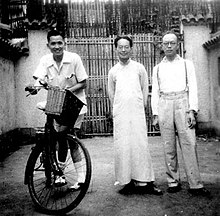Shen Congwen | |||||||||
|---|---|---|---|---|---|---|---|---|---|
 Shen Congwen (middle) with Gu Chuan (far left) and Zhou Youguang (far right) in 1946 | |||||||||
| Born | Shen Yuehuan 28 December 1902 | ||||||||
| Died | 10 May 1988 (aged 85) Beijing, China | ||||||||
| Spouse | Zhang Zhaohe (1910–2003) | ||||||||
| Chinese name | |||||||||
| Traditional Chinese | 沈從文 | ||||||||
| Simplified Chinese | 沈从文 | ||||||||
| |||||||||
| Birth name | |||||||||
| Traditional Chinese | 沈岳煥 | ||||||||
| Simplified Chinese | 沈岳焕 | ||||||||
| |||||||||
Shen Congwen (28 December 1902 – 10 May 1988), formerly romanized as Shen Ts'ung-wen, was a Chinese writer who is considered one of the greatest modern Chinese writers, on par with Lu Xun. Regional culture and identity plays a much bigger role in his writing than that of other major early modern Chinese writers. He was known for combining the vernacular style with classical Chinese writing techniques. Shen is the most important of the "native soil" writers in modern Chinese literature. Shen Congwen published many excellent compositions in his life, the most famous of which is the novella Border Town. This story is about the old ferryman and his granddaughter Cuicui's love story.[1] Shen Congwen and his wife Zhang Zhaohe were married in 1933, Shen Congwen and Zhang Zhaohe had two sons and one daughter after their marriage.
He was slated to win the 1988 Nobel Prize in Literature, but died before he could be awarded the prize.[2]
- ^ Cite error: The named reference
:1was invoked but never defined (see the help page). - ^ Jeffrey C. Kinkley, ed. (2004). Selected Stories of Shen Congwen. Chinese University Press. p. xiv. ISBN 9789629961107.